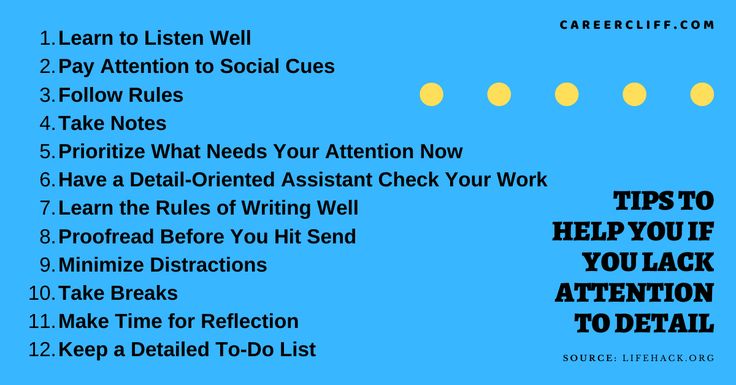Are you someone who often finds themselves making careless errors or missing important details? If so, you may be wondering, “Why do I lack attention to detail?” The truth is, there can be a variety of factors at play. From struggling with focus, organization, planning, or memory, poor attention to detail can arise from a number of causes. The good news is, there are techniques and strategies that can help improve this skill. In this blog post, we’ll explore what it means to lack attention to detail, how to fix it, and whether or not it’s related to ADHD.
Unveiling the Root Cause of My Inability to Focus on Details.
Why do some people lack attention to detail? Poor attention to detail can stem from various factors, such as difficulty with focus, organisation, planning or memory. For instance, if someone has trouble with focusing their attention, they may struggle to concentrate on the task at hand and miss important details. Similarly, if someone has difficulty with planning or organisation, they may overlook important steps or fail to allocate enough time to complete tasks accurately. Memory issues can also play a role in a lack of attention to detail, as individuals may forget crucial information or instructions. However, it’s important to note that attention to detail is not an innate skill but rather a learned one, and there are many techniques that can help people improve their ability to notice and remember details.

🍿 Must Read What is the point of There Will Be Blood?
The Significance of Being Meticulous: The Meaning of a Lack of Attention to Detail.
Attention to detail is a crucial skill in many areas of life, including work, school, and personal relationships. Without it, mistakes can easily slip through, leading to poor performance, misunderstandings, and even dangerous situations. On the other hand, lacking attention to detail can be described as carelessness, which is the opposite of being meticulous and precise. This means that someone who lacks attention to detail does not take the time to appreciate or pay attention to the finer points of a task, project, or situation. They may rush through their work and put little effort into ensuring that things are accurate or precise, which can lead to errors and oversights.
Carelessness can have serious consequences, particularly in high-stakes environments where mistakes can be costly or even life-threatening. For example, a doctor who lacks attention to detail may miss a critical symptom, leading to a misdiagnosis and incorrect treatment plan. Similarly, an engineer who does not pay attention to the small details of a project may overlook a critical flaw, leading to a catastrophic failure. Even in more mundane situations, carelessness can lead to frustration and misunderstandings, such as when a friend forgets an important detail of a plan or a coworker sends an email with multiple typos.
Ultimately, lacking attention to detail is a mindset that centers around a lack of appreciation for the importance of accuracy and precision. Those who struggle with this may need to work on developing their focus and concentration, as well as learning to slow down and take the time to check their work. By doing so, they can minimize errors and oversights and improve their performance in all aspects of life.
Overcoming the Problem of Being Careless with Details.
If you are struggling with a lack of attention to detail, there are several ways to improve this skill. One of the most effective methods is to read books. This not only helps you to focus and concentrate, but it also improves your vocabulary and knowledge base. Additionally, meditating can also be helpful in improving your ability to focus and pay attention to details. By taking a few minutes each day to meditate, you can become more mindful and less easily distracted.
Another way to improve your attention to detail is to spend less time on social media. Social media can be a major distraction, and it can be difficult to stay focused on important tasks when you are constantly checking your notifications. To minimize this distraction, try to limit your time on social media and focus on the task at hand.
It is also important to take your time when working on tasks that require attention to detail. Rushing through a task can lead to mistakes and oversights, so it is important to work slowly and carefully. Additionally, focusing on quality over quantity can help you to pay more attention to details and produce better work.
Using the Pomodoro technique is another effective way to improve your attention to detail. This technique involves working for a set amount of time and then taking a short break. By breaking up your work into smaller, more manageable chunks, you can stay focused and avoid becoming overwhelmed.
Organizing your workspace can also be helpful in improving your attention to detail. A cluttered workspace can be distracting and make it difficult to focus on important tasks. By keeping your workspace clean and organized, you can create a more conducive environment for paying attention to details.
Finally, sticking to a routine can help you to develop better habits and improve your attention to detail over time. By setting aside specific times each day to focus on important tasks, you can train your mind to be more attentive and less easily distracted.

The Factors that Impact Attention to Detail
Attention to detail is an essential skill that is highly valued in many professions. However, several factors can affect your ability to pay attention to detail. One of the most significant factors is your environment. A cluttered workspace can cause distractions and reduce your ability to focus on the task at hand. Therefore, it is crucial to keep your workspace clean, quiet and organized to enhance your ability to concentrate.
Keeping your workspace organized means removing any unnecessary items that can distract you from your work. A cluttered desk can be overwhelming, making it difficult to find what you need and focus on the task at hand. Therefore, it is essential to keep your workspace free of junk and keep the tools you need for your work within reach. This way, you will not waste time looking for resources during your working day, and you can focus on the task at hand.
A quiet workspace is also essential for improving your attention to detail. Noise can be a significant distraction, making it difficult to concentrate. If you work in a noisy environment, consider using noise-canceling headphones or finding a quiet place to work. This way, you can eliminate any distractions and focus on the task at hand.
In conclusion, to improve your attention to detail, you should ensure that your workspace is clear, quiet, and organized. This will help you to concentrate on your work and avoid distractions that can reduce your ability to pay attention to detail. By keeping your workspace organized, you can focus on the task at hand and deliver high-quality work that meets the required standards.
>> Related – What is the point of the movie The House?
Precision and Perfection: Is Attention to Detail a Skill that Can be Developed or Innate?
Attention to detail is a soft skill, meaning it is a personal trait that is difficult to measure and quantify. Unlike hard skills, such as coding or graphic design, which can be taught and measured through certifications or degrees, soft skills focus on personal attributes and behaviors. This is why there are no courses specifically designed to improve your attention to detail. However, there are ways you can refine this skill in your everyday work life.
One way to improve your attention to detail is to slow down. Rushing through tasks, no matter how simple they may seem, can cause you to miss important details. Take the time to review your work, and make sure that everything is correct and in order. This can help you catch mistakes before they become bigger problems.
Prioritizing is another important aspect of improving your attention to detail. Make sure that you are focusing on the most critical elements of your work first. This can help you avoid getting bogged down in minor details that may not be as important. By prioritizing your work, you can ensure that you are giving your full attention to the most critical components of your job.
Overall, attention to detail is a crucial skill to have in any industry. While it may be a soft skill, it is one that can greatly impact your success in your career. By taking the time to slow down and prioritize your work, you can improve your attention to detail and become a more effective and efficient worker.
The Link between Attention Deficit Hyperactivity Disorder and Attention to Detail
When it comes to not paying attention to detail, one condition that often comes to mind is Attention Deficit Hyperactivity Disorder (ADHD). Specifically, individuals with the inattentive type of ADHD may struggle with paying attention to details, alongside other symptoms such as difficulty staying focused, being easily distracted, and struggling to complete tasks or organize their lives. These symptoms can manifest in various aspects of daily life, from forgetting to pay bills to missing important phone calls.
It’s worth noting that while not paying attention to detail is a common symptom of ADHD, it’s not necessarily indicative of the condition. People without ADHD can also struggle with attention to detail, and ADHD is a complex condition that involves a range of symptoms and challenges that go beyond just inattention.
If you suspect that you or someone you know may have ADHD or struggle with attention to detail, it’s important to seek out professional help and support. A diagnosis and treatment plan can help individuals manage their symptoms and improve their overall quality of life.

Can ADHD lead to an inability to focus on small details?
Attention to detail is an important trait that is valued in many professions. It involves being thorough, meticulous, and precise. However, not everyone possesses this quality naturally. For some, it may be a struggle due to underlying factors such as ADHD. ADHD is a neurodevelopmental disorder that affects attention, hyperactivity, and impulsivity. People with ADHD tend to have difficulty staying focused, completing tasks, and paying attention to details.
While perfectionism involves being detail-oriented to a fault, lack of attention to detail is a classic ADHD symptom. People with ADHD may struggle with tasks that require sustained attention and organization, leading to careless mistakes and oversights. They may also struggle with following through on instructions or completing tasks within a set timeframe.
It is important to note that not everyone who struggles with attention to detail has ADHD. Other factors such as stress, fatigue, or lack of interest in the task at hand can also contribute to a lack of attention. However, if you find that you consistently struggle with attention to detail across various aspects of your life, it may be worth seeking an evaluation from a healthcare professional to determine if ADHD is a contributing factor.
In conclusion, while attention to detail is a desirable trait, it is not a hard and fast requirement for success. However, if you find yourself consistently struggling with this skill, it may be worth exploring underlying factors such as ADHD that could be contributing to the issue. By identifying and addressing the root cause, you can work towards improving your attention to detail and achieving your goals.
Unpacking the Symptoms of ADHD- The Tell-Tale Signs of Lack of Focus
ADHD, or Attention Deficit Hyperactivity Disorder, is a neurodevelopmental disorder that affects both children and adults. In children, the inattentive type of ADHD can manifest in a lack of focus and difficulty in concentrating on tasks at hand. This type of ADHD can make it hard for kids to follow instructions and complete assignments, which can lead to poor academic performance and low self-esteem.
Children with the inattentive type of ADHD also have a tendency to forget things and lose items frequently. They may struggle with organizing their belongings or keeping their room tidy. This can cause frustration for both the child and their parents, leading to tension and conflict in the home.
In addition to these struggles with organization and focus, children with ADHD may also have trouble completing tasks or chores. They may start a task only to become distracted and move on to something else before finishing. This can lead to a sense of overwhelm and anxiety for the child, who may feel like they are not able to meet expectations or complete tasks like their peers.
It is important to note that most children with ADHD have a combination of both inattentive and hyperactive-impulsive types. This means that they may also struggle with impulsivity, hyperactivity, and restlessness in addition to attention and focus issues. Understanding the unique challenges that come with ADHD is the first step in helping children with this condition succeed in school and in life.
More to discover
poor attention to detail can have a variety of root causes, from difficulties with focus and memory to organizational and planning challenges. Fortunately, there are effective techniques available to help individuals improve this skill. By implementing these strategies and working to strengthen their ability to focus and stay organized, anyone can overcome their lack of attention to detail and achieve greater success in both their personal and professional lives. Remember, attention to detail is a critical skill that can be developed with time and practice, so don’t give up on your journey to becoming a more detail-oriented individual.
